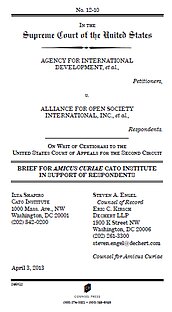Agency for International Development v. Alliance for Open Society International
Learn more about Cato’s Amicus Briefs Program.
Under the United States Leadership Against HIV/AIDS, Tuberculosis, and Malaria Act, the government requires groups receiving federal funding for overseas HIV/AIDS programs to adopt policies explicitly opposing prostitution. Several nonprofit organizations receiving federal funds claim that this “policy requirement” violates their First Amendment rights. They don’t seek to advocate for prostitution (or its legalization), but would rather not speak on the issue at all. Successful efforts to fight AIDS often involve working cooperatively with marginalized groups, so adopting a policy statement that explicitly renounces prostitution could frustrate outreach efforts to disseminate public health information. The government, however, requires funding recipients to espouse such an anti-prostitution policy even when they spend private funds. The district court ruled in the nonprofit groups’ favor, holding that the policy requirement violates the First Amendment. The U.S. Court of Appeals for the Second Circuit affirmed, concluding that the government may not condition the receipt of public funds on giving up First Amendment rights. Indeed, were the government’s position accepted, it would eviscerate the “unconstitutional conditions” doctrine, which the Court has long recognized to prevent the conditioning of generally available federal benefits on the waiver of fundamental rights. Cato filed an amicus brief arguing that the policy requirement significantly burdens political speech, the constitutional protection of which lies at the very heart of the First Amendment. The Supreme Court has made clear that Congress may not condition participation in federal programs on speech limitations that are outside the scope of the program being funded: The Court has never given Congress carte blanche to give federal contractors Hobson’s Choices, whether relating to the freedom of speech or other constitutional rights. It should thus continue to adhere to the principle that Congress’s power to condition funding is limited to ensuring that its funds are used to properly implement the program that Congress wishes to fund, not to compel private organizations to adopt express “policies” that don’t relate to the use of those federal funds.

